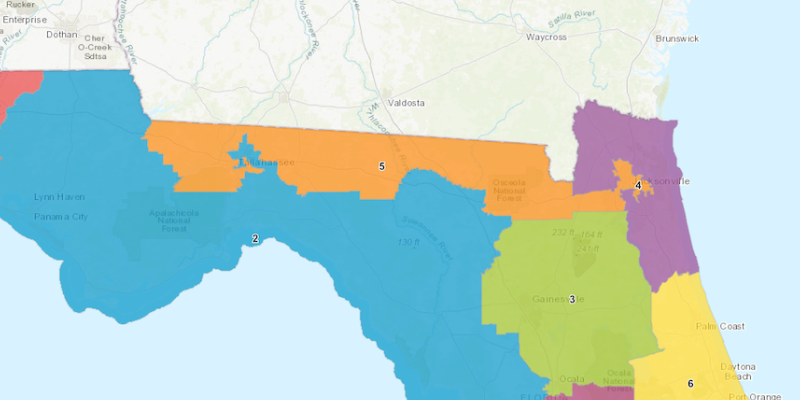A circuit judge has ruled that a congressional redistricting plan pushed through the Legislature by Gov. Ron DeSantis was unconstitutional because it diminished the voting power of Black residents in North Florida.
Circuit Judge J. Lee Marsh sided with voting-rights groups in a lawsuit focused on the former Congressional District 5, which stretched from Jacksonville to just west of Tallahassee. The district, comprising largely Black Democrats, was broken up into several other districts made up mostly of white Republicans.
The district in the past elected Black Democrat Al Lawson. After redistricting, white Republicans won all North Florida congressional districts in the November elections.
Florida voters in 2010 approved a constitutional amendment, known as the Fair Districts amendment, that set standards for redistricting. Part of that barred drawing districts that would “diminish” the ability of minorities to “elect representatives of their choice.”
“Under the stipulated facts (in the lawsuit), plaintiffs have shown that the enacted plan results in the diminishment of Black voters’ ability to elect their candidate of choice in violation of the Florida Constitution,” Marsh wrote in a ruling issued Saturday.
Marsh ordered that the issue return to the Legislature “to enact a remedial map in compliance” with the state Constitution. The ruling, however, is expected to be appealed.
“This is a significant victory in the fight for fair representation for Black Floridians,” Olivia Mendoza, director of litigation and policy for the National Redistricting Foundation, an affiliate of the National Democratic Redistricting Committee, said in a statement. “As a result, the current discriminatory map should be replaced with a map that restores the Fifth Congressional District in a manner that gives Black voters the opportunity to elect a candidate of their choice.”
Attorneys for the Florida House, Senate and Secretary of State Cord Byrd argued during a hearing last month that the U.S. Constitution’s Equal Protection Clause prevented using a district similar to the district Lawson held because it would involve racial gerrymandering.
But Marsh wrote that the state had not proven gerrymandering.
DeSantis cited the equal-protection issue as he effectively took control of the congressional redistricting process last year. He vetoed a plan passed by the Legislature and called a special session that ultimately led to a map that helped lead in the November elections to Florida Republicans increasing their number of U.S. House members from 16 to 20.
While the case initially addressed other districts, attorneys for the plaintiffs and the state last month agreed to narrow it to Congressional District 5. In the agreement, the state acknowledged that “if the non-diminishment standard applies to North Florida, then there is no Black-performing district in North Florida under the enacted map.”
But the state maintained “that the Equal Protection Clause would nonetheless prohibit the creation of a Black-performing district in North Florida.”






